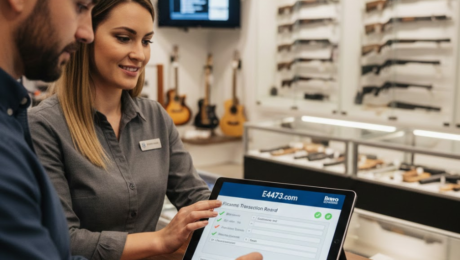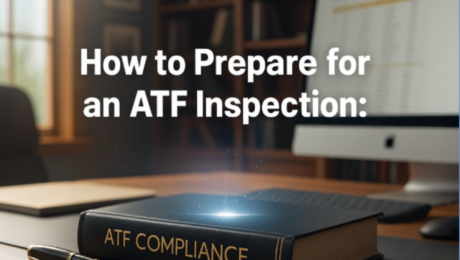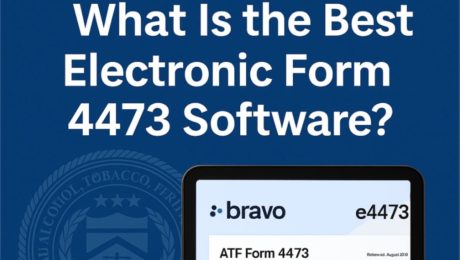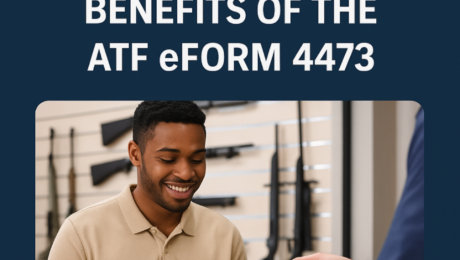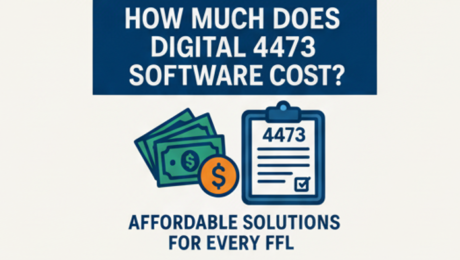What Is ATF Form 4473? A Practical Guide for FFLs and Pawn Shops
Tuesday, February 03 2026
If you’re a Federal Firearms Licensee (FFL) or a pawn shop adding firearms, ATF Form 4473 is one of the most important documents in your operation. To customers, it’s often referred to as “the background check form.” To licensees, it’s a legal firearm transfer record that directly impacts your compliance posture during ATF inspections. In today’s regulatory environment, even small clerical mistakes on Form 4473 can result in findings. Below, the teams at Bravo Store Systems and e4473.com break down what Form 4473 is, when it’s required, and how professionals manage it correctly. What Is ATF Form 4473? ATF Form 4473 (Firearms Transaction Record) documents the transfer of a firearm from an FFL to a non-licensee. Any time a firearm leaves your A&D (Acquisition & Disposition) record—including: Retail sales Trades Pawn redemptions …a properly completed Form 4473 is required, in accordance with current federal and applicable state requirements. Pawn Shop Note For pawn shops, when a firearm is redeemed and returned to the customer from licensed inventory, it is considered a disposition and typically requires: A new Form 4473 A background check consistent with federal and state procedures This applies even if the customer previously owned the firearm. Why Professionals Use Digital e4473 Systems Manual, paper-based 4473 processes are a common source of compliance errors. Many FFLs use digital e4473 solutions, such as Bravo Store Systems with native e4473, to reduce risk and improve accuracy. Electronic Form 4473 workflows are permitted under current ATF guidance when required conditions are met. Key Advantages of Digital e4473 Workflows Error-Aware Guidance Digital 4473 workflows guide users through required fields using conditional logic, helping prevent omissions before the form can be finalized. A&D Alignment When completed within Bravo, Form 4473 data remains aligned with your electronic A&D bound book, reducing mismatches between transfer records and inventory logs. Electronic Retention Under current ATF guidance, FFLs may retain Form 4473 records electronically (and scan legacy paper forms) when conditions such as read-only integrity and ready retrievability are met. Recent rule changes require FFLs to retain Form 4473 records for as long as the business remains licensed, eliminating the previous 20-year destruction allowance. Digital retention can significantly reduce the long-term storage burden. Inspection-Friendly Access With properly controlled, read-only access, licensees can provide investigators with the records they need while restricting unrelated data—streamlining inspections and trace responses. Common Form 4473 Compliance Pitfalls (and How Digital Systems Help) Address Mismatch Paper processes may miss when a buyer’s ID address is outdated. Digital systems can prompt for acceptable supplemental government documentation when a discrepancy is detected. Missing Race or Ethnicity Fields The current Form 4473 requires both ethnicity and race selections. Digital validation enforces completion of required fields before the transaction can proceed. Illegible Handwriting Paper entries can be difficult to read during an audit. Digital entry ensures names, addresses, and serial numbers are clear and consistent. Missing Signatures In busy stores, required signatures can be overlooked. Digital workflows prevent closing a transaction until all required signatures are captured. The Professional Standard: Go Paperless Running a modern firearm or pawn operation without an integrated e4473 system is increasingly risky and inefficient. With e4473.com integrated into Bravo Store Systems, licensees move beyond paperwork and into a repeatable, auditable workflow aligned with: Current ATF guidance on electronic 4473 usage Electronic record retention requirements The latest Form 4473 revisions Ready to Strengthen Your FFL Operations? Don’t wait for an inspection to uncover gaps in your process. Retailers improve accuracy and efficiency by automating compliance workflows. Try Bravo e4473 + POS Make your busiest days feel routine. Bravo’s integrated e4473 + POS supports: Required-field enforcement Address and ID logic Clear, readable records Real-time A&D alignment Compliant electronic retention with rapid retrieval for traces and inspections Book a 20-minute demo Disclaimer: This article is for informational purposes only and does not constitute legal advice. FFLs should always consult the latest ATF rulings and their local Industry Operations Inspectors (IOI) for specific compliance requirements.
- Published in ATF, Business Portal, Cloud Storage, Form 4473, Gun Stores, Uncategorized
No Comments
How Long FFLs Must Retain ATF Form 4473 Records
Thursday, January 15 2026
For every Federal Firearms Licensee (FFL), maintaining accurate and complete records is essential for smooth operations and ATF inspections. The ATF Form 4473—the Firearms Transaction Record—is a core part of that responsibility. Record retention rules for Form 4473 are determined by federal regulation and depend on whether the firearm transfer was completed or not completed. Two ATF Retention Requirements Federal law outlines two distinct retention periods for Form 4473 records. 1️⃣ Completed Firearm Transfers (Firearm Transferred) If the transfer is completed, the FFL must retain the Form 4473 for: ✔ 20 Years Retention begins on the date the firearm is transferred to the customer. This long-term requirement supports law-enforcement trace requests and ensures records are available during ATF inspections. 2️⃣ Transactions Not Completed (Denied or Canceled) If the transaction is not completed—including canceled sales, NICS denials, or incomplete transfers—the FFL must retain Form 4473 for: ✔ 5 Years Retention begins on the date the transaction was canceled or denied. 🔑 Why Proper Record Retention Matters Audit Readiness During inspections, ATF Industry Operations Investigators will review your historical 4473 records to confirm all required forms are present and retained for the correct amount of time. Trace Requests Accurate records help ATF trace firearms recovered in investigations. Missing or incomplete files may cause delays. Avoiding Violations Missing or misfiled forms—even from many years ago—can be cited and may contribute to patterns of non-compliance. 🗃️ Record Storage Considerations Managing two decades of physical 4473s can become challenging for growing FFLs. Paper forms take up space, can be misfiled, and are vulnerable to damage. Many retailers now prefer digital retention solutions that support: ✔ Secure storage Protected from physical damage or loss. ✔ Fast search capability Makes it easier to respond to trace requests or prepare for inspections. ✔ Retention aligned with ATF rulings Digital retention systems help ensure records remain available for the full required period. If your filing cabinets are reaching capacity or your team struggles with retrieval, it may be time to consider a digital workflow. 🎯 Want to Simplify 4473 Record Retention? Learn how Bravo Store Systems supports electronic 4473 workflows, digital retention aligned to ATF rulings, and audit-ready access that helps FFLs stay organized every day. 👉 Request a Bravo e4473 Walkthrough
- Published in ATF, Bulletproof Security, Business Portal, Cloud Storage, Form 4473, Gun Stores, Uncategorized
🛡️ The Single Biggest Cause of ATF Form 4473 Errors (And How to Fix It)
Tuesday, December 09 2025
The ATF Form 4473, officially the Firearms Transaction Record, is the backbone of every legal, over-the-counter firearm sale in the United States. For both the Federal Firearms Licensee (FFL) and the buyer (transferee), completing it accurately is non-negotiable. Yet errors remain common. A single mistake on a paper ATF Form 4473 isn’t just a minor inconvenience that halts a transaction; it represents a significant compliance failure that puts your entire business at risk. During a routine ATF compliance inspection (audit), such errors can result in Financial Penalties, License Jeopardy. It’s critical to have a good defense against penalties and license revocation. So what’s the biggest culprit behind these compliance headaches? The Biggest Cause: Incomplete or Inconsistent Information in Section A While dealer-side errors in Sections B and C can lead to more serious violations, the majority of form rejections begin in Section A ,the portion completed by the buyer. Most issues stem not from intent but from inconsistency or inattention. Even small variations between the buyer’s written information and their photo ID can cause mismatch and administrative rejection. 1️⃣ Inconsistent Residential Address (Box 10) This is the top cause of administrative delays. The ATF requires the transferee’s current physical residential address to be listed in Box 10, and it must match the address on the government-issued photo ID presented to the FFL. The Common Error: A buyer writes their current address, but their ID still lists an old address. Or, they add “Apt. 2B” while their ID shows only “2B.” Even small discrepancies can trigger a rejection, requiring the buyer to provide additional proof (such as a vehicle registration or utility bill). 2️⃣ Misinterpreting the “Prohibited Person” Questions Section A also includes questions about a buyer’s legal eligibility to possess firearms (21.b, 21.g, 21.i, 21.j, etc.), covering felony convictions, restraining orders, unlawful substance use, and more. The Common Error: Buyers may misread these legal definitions. For example, assuming a dismissed charge doesn’t apply when it legally does. Incorrectly marking “No” where the correct answer is “Yes” (or vice versa) can constitute a felony and lead to a NICS denial. 3️⃣ Missing Dates, Signatures, or Checkmarks Every box on the Form 4473 has legal significance. It’s common for buyers to forget to check a box, skip the date (Box 18), or miss the signature (Box 19). The FFL cannot continue the transaction until every required field is completed correctly. ✅ How to Prevent 4473 Errors For Buyers: Bring a Current ID: Ensure your driver’s license or government ID matches your current physical address. If not, bring a supplemental document that proves residency. Read Carefully: Review each question closely. If you’re unsure, ask the dealer before answering. Double-Check Everything: Verify every “Yes” or “No,” date, and signature before submission. For Dealers: Verify ID Accuracy: Confirm the photo ID matches the buyer and that the address aligns with the entry in Box 10. Review Section A: Before completing your portion, check for consistency and completeness. Log Details Correctly: Record the NICS check date/time, result, and disposition information immediately. 💡 How Bravo Store Systems Helps Bravo’s E4473 eliminates these manual risks by guiding the process digitally: Validation at Entry: Buyers can’t skip required boxes or sign before all mandatory fields are completed. Automated Logic: Bravo’s Ee4473 applies ATF rules at every step, ensuring required documentation (like proof of residency) is entered correctly. Digital Accuracy: No handwriting errors, no missing checkboxes, and no unreadable entries. Retention to Spec: All digital 4473s are stored securely per ATF Ruling 2022-01, ensuring 20-year retention with audit-ready accessibility. Result: Fewer corrections. Faster transactions. Complete peace of mind for your FFL. 🎯 Ready to Eliminate 4473 Errors for Good? See how Bravo Store Systems E4473 helps FFLs stay accurate, compliant, and audit-ready 24/7. 👉 Request a 15-Minute Demo Today
- Published in ATF, Bravo POS, Bravo Store Systems, Bulletproof Security, Cloud Storage, Form 4473, Gun Stores, NICS, Uncategorized
🛡️ How to Prepare for an ATF Inspection: Staying Audit-Ready Every Day
Tuesday, December 02 2025
For every Federal Firearms Licensee (FFL), an inspection by the Bureau of Alcohol, Tobacco, Firearms and Explosives (ATF) is part of doing business. An ATF inspection isn’t meant to punish—it’s meant to check that your records and processes follow federal rules. The best defense? Be audit-ready 24/7, not just when the inspector calls. 🔑 Key Takeaways Technology reduces errors: Digital A&D and electronic 4473 systems reduce the mistakes that create violations. Compliance is daily: Your A&D book must be accurate at the end of every business day. Training matters: Every employee who handles firearm paperwork must know the rules and your SOPs. Inspectors focus on four areas: A&D book, 4473s, inventory security, and background check procedures. 1️⃣ Keep a Clean and Accurate A&D Book Your Acquisition & Disposition (A&D) book is the first thing an ATF inspector checks. Every firearm must be logged accurately at the moment it is received or transferred. Record acquisitions and dispositions immediately. Make sure entries are complete, legible, and in the correct order. Review your A&D book daily to confirm everything is up to date. Even small gaps or delays can cause violations during an inspection. 2️⃣ Ensure Every Form 4473 Is Correct The ATF Form 4473 documents every firearm sale. Errors here are one of the most common inspection findings. Check that every required field is answered. Confirm that the buyer’s ID matches the information in Section A. Make sure dates, signatures, NICS details, and disposition information are accurate and complete. Keep all 4473s organized and accessible for the full retention period. A quick review before filing can prevent the most common issues. 3️⃣ Reconcile and Secure Your Inventory Inspectors compare a sample of your physical inventory to your A&D book. Regularly perform internal audits by scanning inventory and comparing them to your records. Investigate any mismatches right away. Report missing or stolen firearms immediately to ATF and local law enforcement and document the event. Keep storage areas secure with proper locks, alarms, and surveillance. Staying proactive prevents surprises during inspection. 4️⃣ Train Your Staff and Follow SOPs Compliance is a team effort. Make sure every employee understands your store’s procedures for logging firearms, running transfers, and completing forms. Train new employees and provide refresher classes for current employees. Keep written SOPs that explain exactly how each process should be handled. Maintain training records—inspectors may ask to see them. Clear, consistent processes reduce mistakes. 5️⃣ Managing the On-Site Inspection When the inspector arrives, staying organized and professional goes a long way. Designate one Responsible Person to communicate with the inspector. Provide a clean workspace and quick access to records. Stay calm and answer questions directly. Review any findings in the Report of Violations and document how you will correct them. A well-run inspection shows your business takes compliance seriously. 🧭 Conclusion: Daily Habits Create Audit Confidence Preparing for an ATF inspection isn’t about last-minute scrambling—it’s about following the right processes every day. Accurate A&D entries, complete 4473s, consistent training, and organized records are what keep your FFL protected year-round. This daily discipline is even easier with the right tools. Bravo Store Systems helps FFLs stay audit-ready by digitizing 4473s, enforcing required fields at entry, maintaining secure digital retention, and keeping the A&D book accurate as you work. Stay confident. Stay compliant. Stay ready—every day. 👉 See How Bravo Keeps FFLs Audit-Ready 24/7 Request a 15-Minute Walkthrough
- Published in ATF, Bravo POS, Bravo Store Systems, Bulletproof Security, Business Portal, Cloud Storage, Form 4473, Gun Stores, Uncategorized
🥇 What Is the Best Electronic Form 4473 Software? Why Bravo’s E4473 Leads the Way
Tuesday, November 18 2025
When it comes to firearm sales, compliance is everything. Every Federal Firearms Licensee (FFL) knows that even small mistakes on the ATF Form 4473 can lead to costly violations or delays. That’s why thousands of dealers are switching from paper forms to digital workflows. The most complete and trusted solution available today is Bravo Store Systems E4473 — a secure, easy-to-use system that keeps your store audit-ready 24/7. Why Bravo’s E4473 Is the Gold Standard for Compliance Bravo’s E4473 isn’t just an online form. It’s part of a complete digital compliance system that connects every step of your operation — from sales to record retention — in one place. ✅ 1. Digital Done Right — Faster, Cleaner, Audit-Ready Bravo’s E4473 isn’t just a digital version of a paper form — it’s a complete compliance upgrade. Every form is legible, automatically stored, and linked directly to your A&D Bound Book. When a trace request comes in, you can find the firearm, pull the attached 4473, and send the record in minutes — no more digging through boxes or handwritten forms. Every step — from customer entry to final signature and digital storage — is paperless, organized, and audit-ready 24/7. 🔗 2. Built Into the Bravo POS System Bravo’s E4473 is natively integrated with the Bravo Point of Sale (POS) and electronic Acquisition & Disposition (A&D) Bound Book, keeping every record accurate and in sync. – Complies with ATF regulation 27 CFR 478.125 — A&D entries made at the time of transaction. 💡 3. Smart Form Logic That Prevents Mistakes Bravo’s smart logic guides each customer step-by-step, skipping non-relevant questions and flagging any missing or problematic answers before the form can be completed. This ensures safety, accuracy and reduces follow-up work. 🧾 4. Automatic Multiple-Sale Reports When a customer buys more than one firearm, Bravo automatically detects the event and generates the required ATF Form 3310.4 (Handgun) or 3310.12 (Rifle) — eliminating manual compliance tasks. 🔍 5. Integrated NICS Background Check Bravo connects directly to the National Instant Criminal Background Check System (NICS), allowing staff to prefill data, submit checks faster, and minimize transcription errors. 🔒 Secure and Compliant — With Optional Cloud Storage Bravo’s E4473 meets all electronic storage requirements outlined in ATF Ruling 2022-01 and Final Rule 2021R-05F. Every form is encrypted, access-controlled, and retained securely for the full 20-year period required under 27 CFR 478.129 when digital storage is enabled. For stores that prefer added convenience, Bravo’s E4473 Cloud Storage is available as an optional feature, providing safe, centralized access to your 4473 records, along with an ATF audit portal for faster, less-stress audits. Regulatory Note: ATF does not certify POS vendors. Bravo aligns with current ATF rulings and provides verifiable audit artifacts to support compliance readiness. Why Dealers Choose Bravo’s E4473 Bravo’s E4473 helps firearm retailers combine compliance, accuracy, and efficiency — transforming required recordkeeping into a modern, reliable workflow. 🛑 Eliminate Costly 4473 Errors Real-time validation prevents incomplete or incorrect forms before they’re saved — helping you avoid rework, delays, and inspection findings. 🕒 Stay Audit-Ready 24/7 Every E4473 is automatically time-stamped, indexed, and stored to specification, so records are available in seconds during ATF inspections. ⚙️ Simplify Compliance Without the Stress Automated logic, instant A&D posting, and built-in multiple-sale reporting let your staff focus on customers instead of paperwork. 🚀 Accelerate Every Transaction, Safely Integrated NICS submissions and auto-filled fields reduce time per sale, improving customer flow and freeing staff for more valuable work. 💼 Strengthen Your Reputation A fast, accurate, and fully digital process builds customer confidence and demonstrates professionalism during audits or compliance checks. The Bottom Line For FFLs who want confidence, speed, and precision in every firearm sale, Bravo E4473 delivers the edge: fewer errors, faster service, and full peace of mind — all in one audit-ready platform. 📞 See Bravo E4473 in Action
- Published in ATF, Bravo POS, Bulletproof Security, Business Portal, Cloud Storage, Company News, Form 4473, Gun Stores, Holiday Gift Guide, NICS, Uncategorized
What Are the Benefits of Digital 4473 eForm
Tuesday, November 11 2025
Essential Compliance for Modern Federal Firearms Licensees (FFLs) For every Federal Firearms Licensee (FFL), compliance is the backbone of your business. The ATF Form 4473 — officially the Firearms Transaction Record — is the most important document in every firearm sale. Yet for many dealers, paper forms still create daily risk: missed fields, handwriting errors, and hours lost in filing and retrieval. That’s why today’s leading firearm retailers are moving to digital 4473 compliance systems that enforce ATF rules at entry, retain records, and keep you audit-ready 24/7 — without binders, backlogs, or stress. 🔒 1. Fewer Errors, Stronger Compliance Paper 4473s are the number one source of ATF inspection findings. Bravo’s digital E4473 validates every required field in real time — including IDs, residency checks, and signatures — before a form can be saved. Every transaction is automatically checked for accuracy and stored to ATF standards for digital retention → Result: Fewer clerical errors, faster audits, and stronger license protection. ⚙️ 2. Faster Transactions, Lower Operating Cost Manual forms drain hours in handwriting, filing, and physical retrieval. With digital 4473s, staff complete transactions on secure in-store tablets or kiosks — no re-keying, no stacks of paper. Forms are encrypted and stored digitally, freeing up space and cutting audit preparation time by 10–40 hours per cycle. → Result: Lower overhead, faster counter flow, and more time serving customers. 📂 3. Easier Audits, Instant Retrieval When the ATF walks in, time matters. Every e4473 in Bravo is indexed, time-stamped, and instantly searchable by customer, serial number, or transaction date. Records are securely retained, protected from loss or damage. → Result: Faster inspections, fewer interruptions, and peace of mind. Bonus Advantage: Bravo’s read-only ATF Auditor Login gives inspectors limited, time-boxed access — keeping you in control while speeding up the process. ⚡ 4. Better Customer Experience Compliance shouldn’t slow down sales. Digital 4473s streamline the checkout process with secure digital signatures and clean, professional workflows. Staff stay focused on service — not paperwork — creating a faster, more confident experience for every customer. 💡 5. One Integrated Compliance Workflow Bravo unifies your Point of Sale (POS), A&D bound book, and digital 4473 in one seamless workflow. Each sale updates across all records automatically. No double entry — 4473, sale, and A&D post together. No mismatched records — validation at save ensures accuracy. Always audit-ready — every record stored to spec and exportable in a few clicks. Variance-approved for electronic 4473 + digital storage, built with ATF input. → Result: Compliance confidence and operational speed — built into your daily routine. Testimonial: “We just completed our ATF inspection and are proud to report a flawless outcome. Inspectors were highly impressed with Bravo’s E4473, cloud-based system, and the ATF Audit Portal. The process was smooth, efficient, and fully compliant thanks to Bravo’s powerful tools and our team’s strong checks and balances. Big thanks to Bravo for delivering such an essential feature. If you’re not using it yet, I highly recommend making the switch.” Rating: ⭐⭐⭐⭐⭐ (5/5) Business: Pawn Central Customer: Tawnya Pearson Location: Portland, OR Date: May 13 🔔 Ready to See It in Action? Book a 15-Minute Walkthrough → Learn how E4473, Task Manager, and the Bravo E4473 Cloud Storage work together for full compliance confidence.
- Published in Uncategorized
How Much Does Digital 4473 Software Cost?
Tuesday, November 04 2025
For every Federal Firearms Licensee (FFL)—from new startups and family-run shops to growing multi-store operations—the question of going digital is no longer about if, but when. It’s not just efficiency—it’s smart, affordable compliance that scales as you do. Modern Digital 4473 Pricing — Clear, Simple, Scalable Gone are the days of complicated tiers and setup fees. Bravo Store Systems now offers a single, transparent pricing model built around its modular Firearms Hub — the all-in-one compliance suite for modern firearm retailers and pawn FFLs. 🔐 Firearms Hub — $129/month Your Firearms Hub includes every compliance feature you need to stay audit-ready and efficient from day one: ATF eForm 4473 (electronic Form 4473 with digital retention) Automated Form 3310s (multiple handgun sale reporting) Vendor Catalog Integrations (RSR, Lipsey’s, Davidson’s, and more) Firearm Transfers (FFL-to-FFL workflow built in) eNICS Chrome Extension (streamlined background check process) Gunsmithing + Special Orders (track work orders and repairs easily) 💡 No setup fees. No hidden add-ons. Just one straightforward monthly price: $129 per store, per month. Flexible by Design — Pay for Only What You Need Bravo’s modular Hub System lets you build the exact solution your business requires. Each Hub adds a core set of tools — such as Firearms, E-commerce, or Pawn & Retail — and you can add or remove them anytime as your business evolves. Your business. Your mix. Your control. Our team works directly with each store to configure the right combination of Hubs and add-ons — ensuring you pay only for what you use and get the ROI you expect. Why Bravo Is a Smart Investment Instant Risk Reduction: Every 4473 is validated at entry, helping you catch errors before they reach your bound book. Automated Compliance: Forms 3310 and NICS checks are automatically handled within your workflow. Faster Daily Flow: No manual entry or paper filing — transactions post directly to your bound book in real time. Audit-Ready Confidence: Records are retained to ATF specifications and accessible through a secure, licensee-controlled auditor login. 🎯 The Bottom Line For $129/month, Bravo’s Firearms Hub transforms compliance from a paperwork headache into a competitive edge. It’s the simplest, most complete, and most cost-effective way to stay audit-ready 24/7 while streamlining your operations. See how easy audit-ready compliance can be. Schedule your free demo today and find the right Bravo Hub for your store
- Published in ATF, Bravo POS, Bravo Store Systems, Bulletproof Security, Cloud Storage, Form 4473, Gun Stores, NICS, Uncategorized
Ditch the Paper, Slash the Costs: Why Digital Form 4473 Pays for Itself
Tuesday, October 21 2025
For Federal Firearms Licensees (FFLs), compliance isn’t optional — it’s the backbone of your business. But every paper ATF Form 4473 you file carries hidden costs: hours of labor, storage fees, and the ever-present risk of clerical error. E4473 by Bravo Store Systems replaces that friction with automation, accuracy, and audit-ready confidence — built right into your point of sale. The Hidden Costs of Paper 📜 Paper may look cheap, but it drains profit in four ways: Pitfall: Human Error – Hidden Cost: The #1 source of ATF violations. Handwriting, skipped fields, and correction errors create rework, citations, and risk. Pitfall: Time Sink – Hidden Cost: Staff spend paid hours reviewing, correcting, and filing forms instead of helping customers. Pitfall: Audit Stress – Hidden Cost: ATF audits mean digging through cabinets and boxes—slow retrieval increases inspection time and exposure. Pitfall: Storage Overhead – Hidden Cost: You pay for valuable space to store 20 years of records that could live securely in the cloud. The ROI of Going Digital 💰 Transitioning to a digital 4473 isn’t a tech upgrade — it’s a profitability move that saves time, eliminates errors, and protects your license. Fewer Errors, Greater Protection E4473 validates every field before submission, preventing the mistakes that drive most ATF violations. Real-time validation: Customers can’t skip required questions or enter invalid data. Built-in help text: Clarifies confusing items, reducing clerk intervention. Perfect legibility: Every form is clean, consistent, and auditor-ready — no handwriting to interpret. Result: fewer corrections, faster audits, and less stress for your compliance team. Time Saved Is Revenue Earned Every minute not spent on paperwork is a minute spent selling, serving, or training. Accelerated completion: Customers fill out the digital 4473 on a kiosk or tablet — no duplicate data entry. Instant retrieval: Locate any form in seconds instead of hours. Integrated workflows: E4473 connects with NICS and your A&D Bound Book for automatic updates. That’s how Bravo turns compliance time into business time. Lower Overhead, Higher Security Cloud retention: Records are securely stored for the full 20-year retention period — accessible anywhere, anytime. No paper storage: Free up square footage for merchandise, not filing cabinets. Disaster-ready backups: Protection against fire, flood, or theft — risks that destroy paper but not encrypted cloud data. Make the Switch with Bravo Store Systems Migrating from paper to digital compliance can sound daunting, but Bravo Store Systems makes it simple. E4473 is fully integrated with Bravo Point of Sale, giving you one system for sales, loans, and firearms compliance — no plug-ins, no double work. Unified workflow: Sell an item, auto-generate the digital 4473, update your bound book — all in one motion. Audit-ready 24/7: Digital retention to ATF spec; export in clicks, not hours. Expert support: Bravo’s firearms specialists understand ATF protocols and help your team stay inspection-ready year-round. Stop paying for inefficiency. Start operating with precision, speed, and compliance built in. 👉 See How E4473 Works ›
- Published in ATF, Bravo POS, Bravo Store Systems, Bulletproof Security, Business Portal, Cloud Storage, Company News, Form 4473, Gun Stores, NICS, Uncategorized
Navigating FFL Operations During a Federal Government Shutdown
Tuesday, October 14 2025
Expert Guidance from E4473 (a product of Bravo Store Systems) As of October 1, 2025, the federal government has officially entered a shutdown following Congress’s failure to pass a budget. For Federal Firearms Licensees (FFLs), this moment demands clarity, precision, and proactive compliance. Understanding which federal functions remain active—and which do not—is critical to maintaining lawful operations. At E4473 (Part of Bravo Store Systems), our mission is to provide the most trusted digital infrastructure for ATF compliance—purpose-built to help FFLs maintain accuracy, continuity, and audit-readiness even during federal uncertainty. Federal Functions Affected by the Shutdown Several essential ATF functions are temporarily paused until federal funding is restored: ATF NFA Branch Closed: The National Firearms Act (NFA) Branch has suspended all reviews and approvals. While Form 1, Form 3, and Form 4 submissions can still be filed, no processing will occur until staff return. Distributor Transfers (Form 3s) Paused: Distributors cannot ship regulated items (e.g., silencers) unless their Form 3 was pre-approved, restricting inventory flow. Customer NFA Transfers Delayed: Examiner review of customer Form 4s is paused, delaying final delivery of NFA items. FFL Licensing Center Frozen: New FFL and SOT applications and renewals are on hold until normal operations resume. Functions That Remain Operational Not all systems stop during a shutdown. Key services essential to daily firearm sales continue: FBI NICS Checks Remain Active: The National Instant Criminal Background Check System remains operational, allowing firearm transfers using Form 4473 without interruption. Form 4473 Processing Unaffected: Daily sales and transfers may continue as usual, provided all Form 4473 entries are accurate and complete. Pro Tip: Use the downtime to prepare NFA transactions—capture customer data, collect fingerprints, and pre-fill digital forms so submissions are ready when ATF systems reopen. Strengthening Compliance Amid Uncertainty Periods of political uncertainty often bring increased firearm activity. With higher transaction volume and reduced federal oversight, compliance precision matters more than ever. Paper-based 4473 errors—such as missing initials or incorrect dates—remain violations that can trigger citations or even license risk. That’s where Bravo E4473 delivers proven protection: Digital Precision → No Paper Errors Built-in field validation and automated compliance checks eliminate manual mistakes before they happen. Audit-Ready 24/7 Every record is securely stored, organized, and instantly exportable—so inspection readiness is never in question. Scalable for High-Volume Operations Handle transaction surges seamlessly without sacrificing accuracy or compliance integrity. Customer Proof: ATF Audit Success in the Field Mark H., Owner — Casa Pawn “Our IOI’s parting comments were, ‘This is the cleanest audit I have had in a pawn shop, ever.’ While our team’s effort contributed to that result, Bravo gets most of the credit. There is no mistaking that E4473, combined with Bravo’s recordkeeping, makes audits this smooth.” This experience reflects what thousands of FFLs report with Bravo E4473—error-free audits, faster inspections, and total confidence under pressure. Conclusion: Compliance Without Compromise A federal shutdown may pause key ATF functions—but your operation doesn’t have to pause with it. E4473 (Part of Bravo Store Systems) ensures your business stays compliant, efficient, and ATF-ready 24/7, no matter the political climate. Stay prepared. Stay compliant. Stay ahead. → Learn more at www.e4473.com
- Published in ATF, Bravo POS, Bulletproof Security, Business Portal, Cloud Storage, Company News, Form 4473, Gun Stores, Uncategorized
Even the Undead Can’t Excuse Bad Paperwork: Your FFL’s Guide to Zombie Apocalypse Compliance!
Tuesday, October 07 2025
The air is thick with dread. Not just the scent of decomposing undead, but that familiar, icy chill of an impending ATF audit. “But… but it’s the apocalypse!” you stammer, sweat beading on your brow. “There are zombies at the gate! Surely, they’ll understand!” Think again, brave FFLs and savvy pawn shop owners. While the world outside your fortified establishment may have devolved into a shambling, brain-munching free-for-all, some things remain sacred. And at the top of that list, right next to a fresh clip of 5.56, is ATF compliance. That’s right. Even when the moon is full, the dead walk the earth, and your best customer is a survivor trading canned goods for a new AR, the good ol’ ATF still expects your ducks (and your 4473s) to be in a row. Because let’s face it, a ghoul-infested wasteland is no excuse for a messed-up bound book. The Horror of Non-Compliance: More Terrifying Than a Horde of Walkers Imagine this nightmare scenario: You’ve survived the initial onslaught. Your shop is a beacon of hope (and firepower) in a desolate landscape. Then, a lone figure, impeccably dressed despite the global collapse, strolls in. It’s an ATF agent, and they’re not here for a new tactical flashlight. They’re here for your records. Missing 4473s? That’s not just a fine, that’s a major infraction – and in the apocalypse, resources are too precious to waste on administrative penalties. Bound Book Errors? A tangled mess of paper in a world already full of actual tangles (of entrails, mostly) is an invitation for trouble. Improper Dispositions? Explaining that you “bartered a shotgun for three cans of peaches and a slightly-chewed baseball bat” won’t fly without the right digital trail. The moral of the story? A sloppy FFL isn’t just a risk; it’s a target. And while zombies might eat your brains, the ATF can eat your license – a far more devastating blow to your post-apocalyptic enterprise. Your Zombie Apocalypse Survival Kit: E44733.com & Bravo Store Systems Thankfully, you don’t have to face this double threat alone. While you’re busy defending your perimeter from the groaning masses, E4473 3.com and Bravo Store Systems are working tirelessly behind the scenes to keep your business bulletproof from the other kind of audit. 1. E4473.com: Digital Fortification for Your Form 4473s In a world where paper is a fire hazard and a zombie could sneeze all over your paperwork, E4473 .com is your digital fortress. This isn’t just an electronic version of a form; it’s an intelligent shield. E4473.com catches common errors on the spot, like a guardian angel whispering “You forgot to check box 10b” before the ATF can even raise an eyebrow. It ensures every form is properly filled out, so you’re not left scrambling to correct mistakes with a quill pen and a broken gas lamp. Plus, every completed form is securely stored in the cloud, safe from floods, fire, and the inevitable zombie-induced power outage that would destroy your old hard drive. When an ATF agent does show up, you can simply pull up a clean, digital record with a few clicks, proving your diligence even in the face of total chaos. 2. Bravo Store Systems: Your Bound Book in the Cloud Forget your dusty, water-damaged A&D bound book. In the apocalypse, every inch of space is precious and every second counts. With Bravo Store Systems, your inventory and bound book are integrated into a single, seamless digital platform. This is your mission-critical command center. When you trade a revolver for a fresh carton of eggs, Bravo instantly and correctly logs the transaction. When you receive a shipment of much-needed ammo (if the delivery truck made it), it’s entered into your system with the click of a button. It keeps a perfect, real-time record of every firearm entering and leaving your inventory. This means no more transcription errors, no more misplaced pages, and no more fumbling through old books while a zombie is pounding on the front door. Bravo gives you the peace of mind to focus on what really matters: keeping your survivors armed and your business thriving. The Last Stand for Your FFL This Halloween, remember: the real horror isn’t the zombies outside — it’s a missed 4473 or bound book error inside. With E4473, every form is validated at entry and stored to spec, so you’re always ready when an inspector appears. With Bravo Store Systems, every firearm is logged in real time — acquisitions and dispositions posted instantly, bound book audit-ready 24/7. Because in the apocalypse (or just a busy season), the only thing scarier than the undead is an ATF inspection you’re not prepared for. 👉 Book a Walkthrough
- Published in ATF, Bravo POS, Form 4473, Gun Stores, Uncategorized

